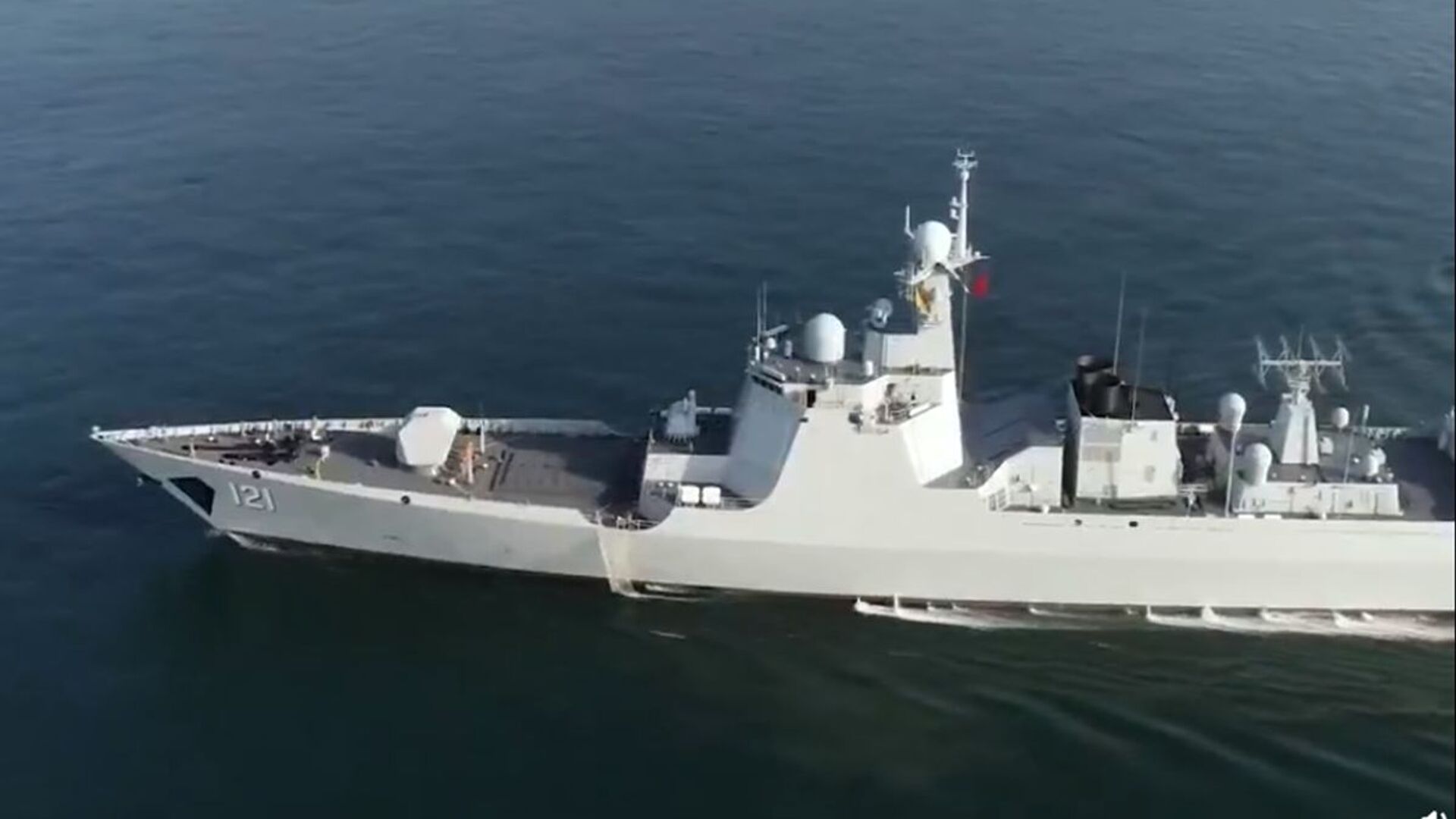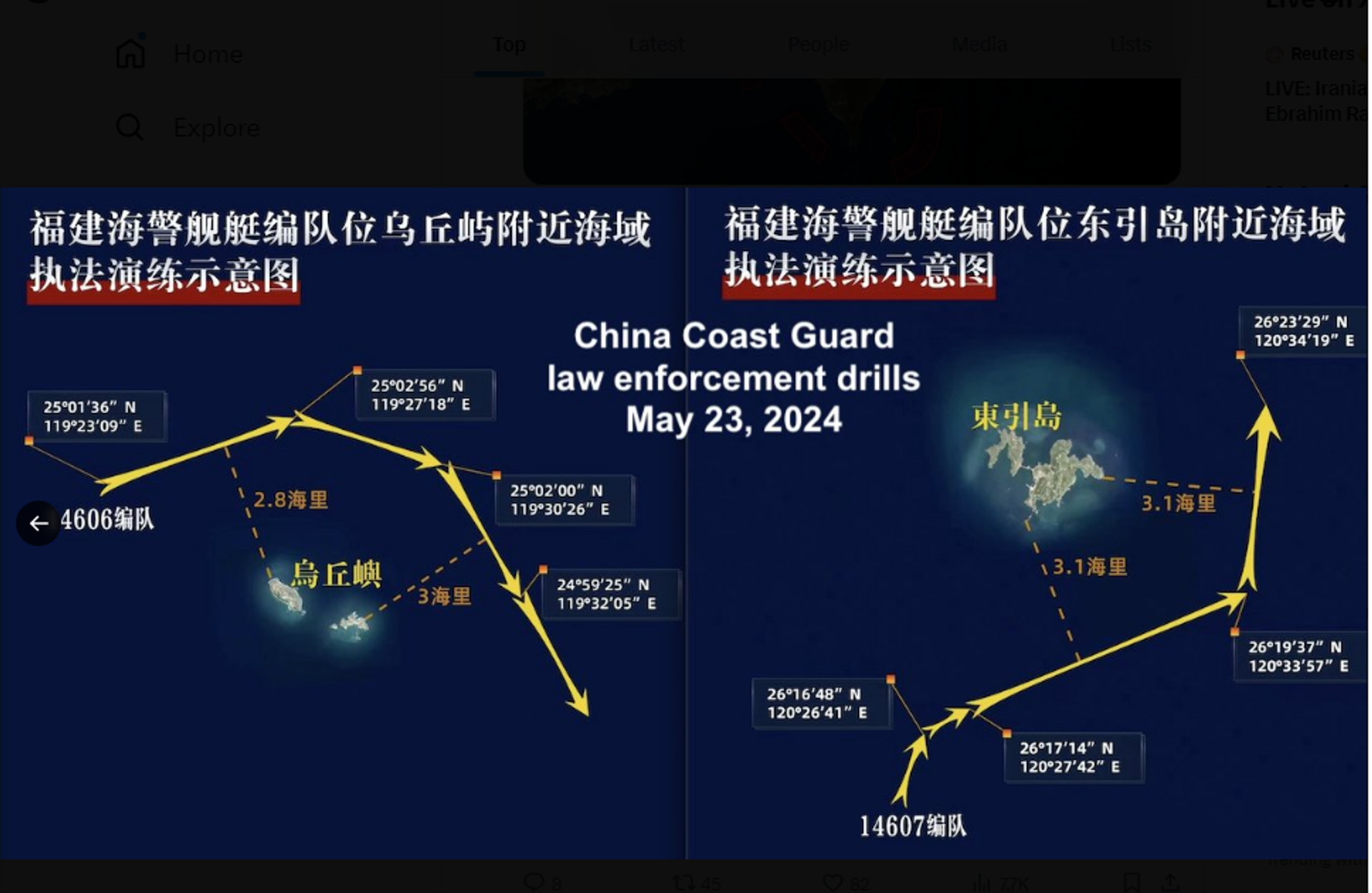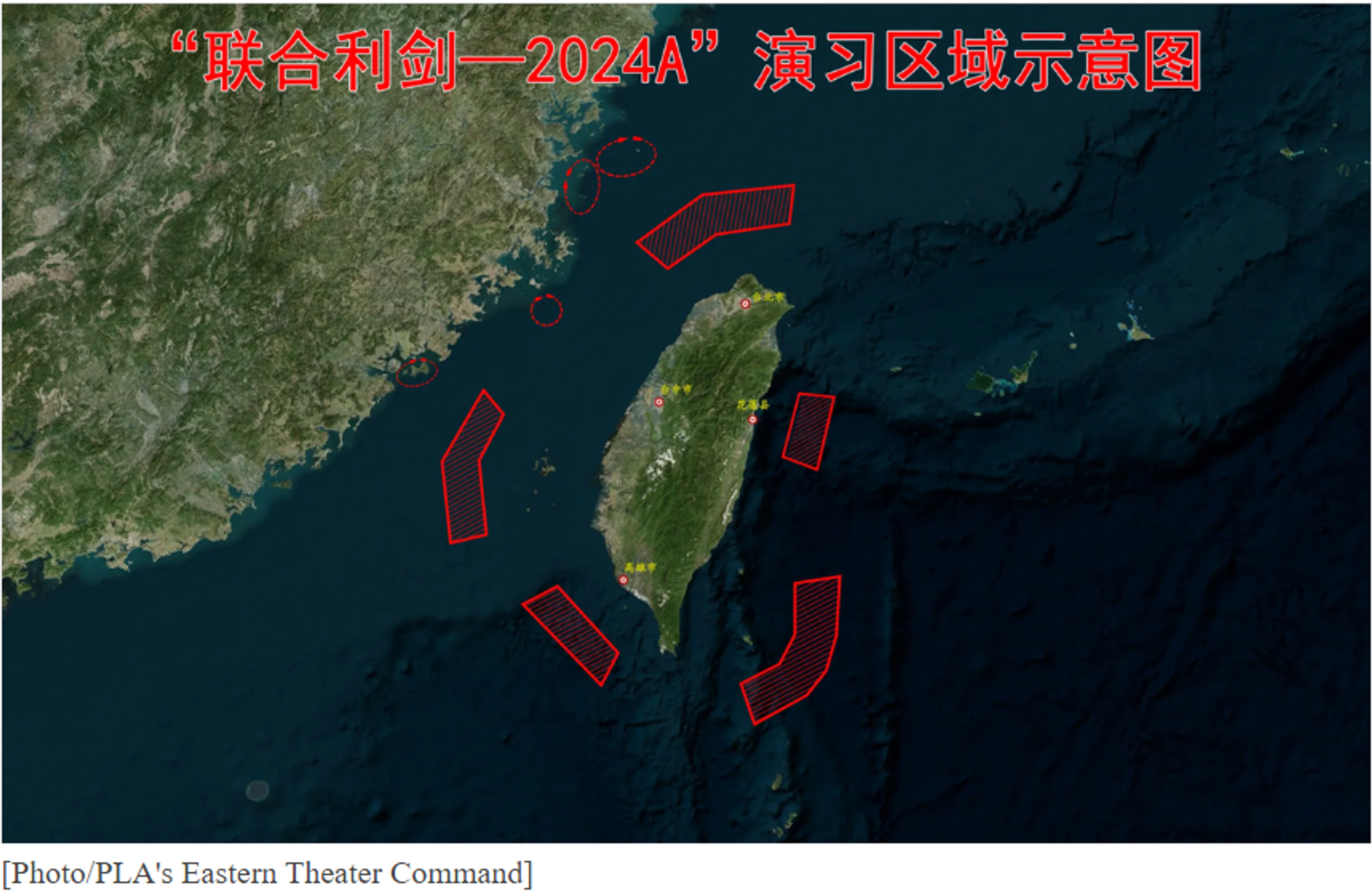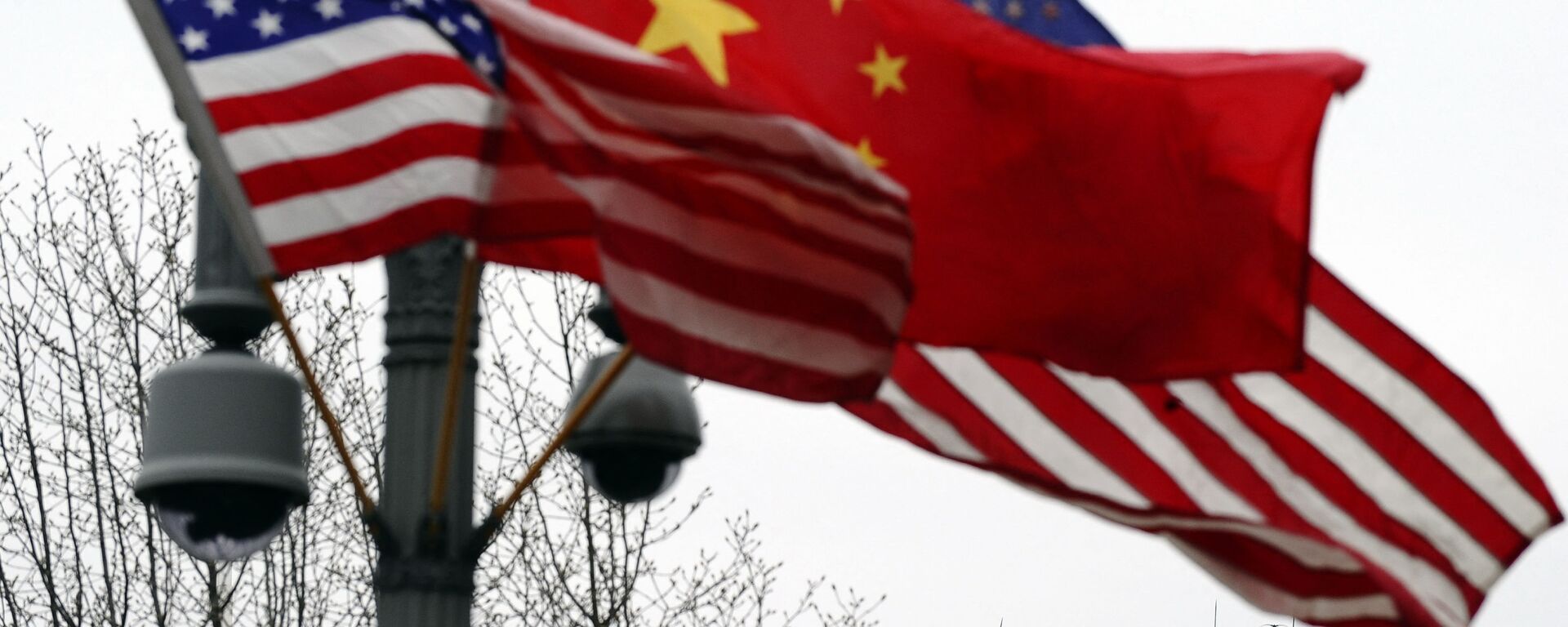https://sputnikglobe.com/20240523/china-starts-military-drills-around-taiwan-as-warning-to-meddling-external-forces-1118594317.html
China Starts Military Drills Around Taiwan as 'Warning' to Meddling 'External Forces'
China Starts Military Drills Around Taiwan as 'Warning' to Meddling 'External Forces'
Sputnik International
Eastern Theater Command of the Chinese People's Liberation Army (PLA) started joint military drills around the island of Taiwan.
2024-05-23T06:05+0000
2024-05-23T06:05+0000
2024-05-23T06:05+0000
asia
china
taiwan
taiwan strait
beijing
chinese people’s liberation army
democratic progressive party (dpp)
https://cdn1.img.sputnikglobe.com/img/07e4/0a/0d/1080756241_0:23:1200:698_1920x0_80_0_0_eeea9615eb9e252aa048ebe5711f01da.jpg
China has started large-scale military drills in areas around Taiwan. The exercises codenamed Joint Sword 2024A will be conducted from May 23 to 24, and involve military services including the army, navy, air force, and rocket force, the Eastern Theater Command of the Chinese People’s Liberation Army announced.Specifically, the drills are being conducted in the Taiwan Strait, north, south, and east of Taiwan, as well as areas around the Taiwan-controlled islands of Kinmen, Matsu, Wuqiu, and Dongyin, as per the command’s statement.The exercises serve as a "strong punishment" against the separatist acts of the "Taiwan independence" forces and a "stern warning" to interference and provocation by “external forces,” Li Xi, spokesperson for the theater command, said in a statement. The maneuvers will focus on practicing joint maritime and aerial combat readiness in areas around the island of Taiwan to test joint real combat capabilities, Li said.The show of strength comes just days after US-backed Taiwan’s new regional leader, William Lai Ching-te, took his oath of office. Shortly after Taiwan's ruling Democratic Progressive Party (DPP) pro-independence candidate won the election, he vowed to “protect Taiwan from China's continued threats and intimidation."In response, China's Taiwan Affairs Office chief Chen Binhua declared that Beijing “will adhere to the 1992 consensus, which embodies the One China principle, and firmly oppose separatist actions aimed at achieving Taiwan's independence, as well as interference by external forces."Beijing will work with all political parties and groups of Taiwan's society to promote exchanges and cooperation with the island, as well as peaceful relations with Taipei and the "reunification of the motherland," Chen added.The drills also come as the US has been further stoking tensions in the region with a swathe of joint drills. The expansive US-Philippines Balikatan war games in April were held near the South China Sea, where both Beijing and Manila have territorial claims.Beijing slammed the drills as exacerbating regional tensions. Chinese Foreign Ministry spokesman Lin Jian said the Philippines "should understand that drawing in countries outside the South China Sea to flex their muscles and stoke confrontation in the region will only intensify tensions and undermine regional stability." Lin said that by seeking to bolster its security using external forces, the Philippines "will only put itself into greater insecurity, and even become the pawn of others."
https://sputnikglobe.com/20240113/us-backed-candidates-victory-in-taiwan-means-year-of-the-dragon-is-going-to-be-tense-1116147787.html
https://sputnikglobe.com/20240507/us-assembles-squad-of-allies-to-counter-china-1118318135.html
china
taiwan
beijing
Sputnik International
feedback@sputniknews.com
+74956456601
MIA „Rossiya Segodnya“
2024
News
en_EN
Sputnik International
feedback@sputniknews.com
+74956456601
MIA „Rossiya Segodnya“
Sputnik International
feedback@sputniknews.com
+74956456601
MIA „Rossiya Segodnya“
china's drills, china holds joint drills, eastern theater command of the chinese people's liberation army (pla) started joint military drills around the island of taiwan, tensions over taiwan, taiwan issue, us-philippines military exercises, china, south china sea, nato expansion in asia, philippines provocation, militarization of philippines, taiwan, island of taiwan, asia-pacific, indo pacific, us drills china, nato asia, japan us drills, china's one country, two systems policy.
china's drills, china holds joint drills, eastern theater command of the chinese people's liberation army (pla) started joint military drills around the island of taiwan, tensions over taiwan, taiwan issue, us-philippines military exercises, china, south china sea, nato expansion in asia, philippines provocation, militarization of philippines, taiwan, island of taiwan, asia-pacific, indo pacific, us drills china, nato asia, japan us drills, china's one country, two systems policy.
China Starts Military Drills Around Taiwan as 'Warning' to Meddling 'External Forces'
After a US-backed pro-independence candidate won the local election in Taiwan at the start of the year, China reiterated that it would continue to push back on the island’s independence in 2024, while also promoting cooperation and peaceful reunification under the "one country, two systems" policy.
China has started large-scale military drills in areas
around Taiwan. The exercises codenamed
Joint Sword 2024A will be conducted from May 23 to 24, and involve military services including the army, navy, air force, and rocket force, the Eastern Theater Command of the Chinese People’s Liberation Army announced.
Specifically, the drills are being conducted in the Taiwan Strait, north, south, and east of Taiwan, as well as areas around the Taiwan-controlled islands of Kinmen, Matsu, Wuqiu, and Dongyin, as per the command’s statement.
The exercises serve as a "strong punishment" against the separatist acts of the "Taiwan independence" forces and a "stern warning" to interference and provocation by “external forces,” Li Xi, spokesperson for the theater command, said in a statement. The maneuvers will focus on practicing joint maritime and aerial combat readiness in areas around the island of Taiwan to test joint real combat capabilities, Li said.
The show of strength comes just days after US-backed Taiwan’s new regional leader, William Lai Ching-te, took his oath of office. Shortly after Taiwan's ruling Democratic Progressive Party (DPP)
pro-independence candidate won the election, he vowed to “
protect Taiwan from China's continued threats and intimidation."
In response, China's Taiwan Affairs Office chief Chen Binhua declared that Beijing “will adhere to the 1992 consensus, which embodies the One China principle, and firmly oppose separatist actions aimed at achieving Taiwan's independence, as well as interference by external forces."
Taiwan has been governed independently of mainland China since 1949. Beijing views the island as its province, while Taiwan — a territory with its own elected government — maintains that it is an autonomous country, but stops short of declaring independence. China opposes any official contacts of foreign states with Taipei and considers Chinese sovereignty over the island indisputable.
Beijing will work with all political parties and groups of Taiwan's society to promote exchanges and cooperation with the island, as well as peaceful relations with Taipei and the "
reunification of the motherland," Chen added.
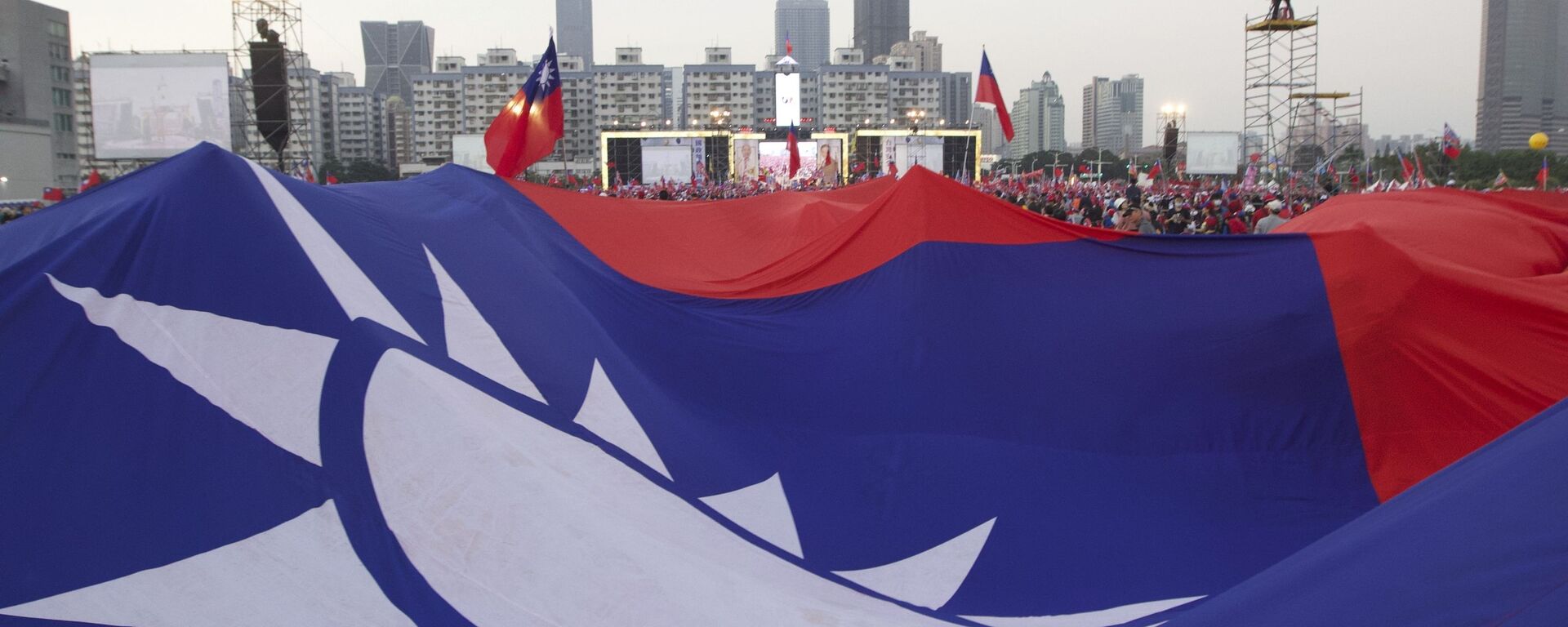
13 January 2024, 19:07 GMT
The drills also come as the US has been further stoking tensions in the region with a swathe of joint drills. The
expansive US-Philippines Balikatan war games in April were held near the South China Sea, where both Beijing and Manila have territorial claims.
Beijing slammed the drills as exacerbating regional tensions. Chinese Foreign Ministry spokesman Lin Jian said the Philippines "should understand that drawing in countries outside the South China Sea to flex their muscles and stoke confrontation in the region will only intensify tensions and undermine regional stability." Lin said that by seeking to bolster its security using external forces, the Philippines "will only put itself into greater insecurity, and even become the pawn of others."
